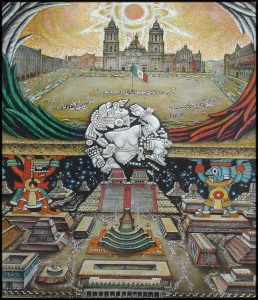Cornelius Vanderbilt led a life of conflict and economic success, and during that life, he earned the nickname “The Commodore.” This nickname had an incredible impact on all who heard it. The child that grew up to become the Commodore was taught to be ruthless and smart when it came to the practice of business. It is undeniable to say that that child grew up to be one of the most influential men in American History, whose legacy will continue on centuries after his passing, whether that legacy was positive or negative. Cornelius Vanderbilt was one of the many men who helped shape American industry. He can be seen as the man who started one of the most economically prosperous periods of American history, the Gilded Age. The story of Vanderbilt and his legacy is long and winding, with shrewd, cunning, and sometimes illegal business deals to be made, and the development of a shipping industry that would rock the east coast and put him on the map. And it all started with a single boat and a small loan.
Cornelius Vanderbilt did not live a life that was common. At the age of eleven, Vanderbilt had to drop out of school and begin working for his father in his shipping business, where he began a new type of education, one that would alter his future and continue to shape an era of American history. This period of his life was crucial and was a pivotal moment for the man he would soon become. The knowledge he obtained while working with his father provided him with a work ethic that catapulted him into becoming a prominent businessman. His father taught him many tools of the trade, that Vanderbilt would not only use often but mastered and became the foundation of his many business practices. He was taught about aggressive marketing and the art of making shrewd deals that would put him above his competitors. But as all birds eventually leave the nest, Vanderbilt aimed for something greater. He began working for himself. He formed his own company by taking a loan from his parents at the young age of sixteen. He bought a ship that he named Swiftsure. In having taken that loan from his parents, he was required to pay them back, resulting in him only receiving half of the profit from his new ferry company.1
Vanderbilt soon shocked the world and quickly rose in popularity as a result of his young age and success. But it was not until the age of eighteen that his empire really took off. He contracted with the United States Government to supply troops with much-needed supplies during the War of 1812. By the end of the war, he had acquired enough funds to purchase a small fleet of boats. Due to his time working with the Government, he was given the nickname “Commodore,” but it was common at the time. His work within the ferry industry led to him starting his shipping empire, which would lead to many business opportunities and business partners. All of this drew the attention of Thomas Gibbons, who was a prominent and well-known businessman, who approached Vanderbilt, asking him if he would captain one of his ships. Vanderbilt then began working for Gibbons and soon became a business manager, all the while continuing to own and operate his own business on the side.2

But not all was going well for Gibbons. Prior to meeting Vanderbilt, Gibbons had been in a long-standing feud against a monopoly that continued while Vanderbilt was working with him. The feud resulted in a legal case that was ultimately resolved in the Supreme Court decision of Gibbons v. Ogden. This case is still viewed as a landmark decision. It proved that Congress had power over interstate commerce and was not subordinate to state laws. This case was brought about due to Gibbons being accused of violating a state-sanctioned monopoly that had been given to Robert Livingston and Robert Fulton. Aaron Ogden sued Gibbons for violating the state statute. Vanderbilt and Gibbons hired Daniel Webster to defend them. Chief Justice John Marshall wrote the majority opinion, stating that New York did not have the authority to regulate interstate navigation, for it was protected under the Commerce Clause of the Constitution.3
Vanderbilt continued onward with his strong work ethic and understanding of business. He began using what he had learned during the time he had worked for his father. While under the guidance of Thomas Gibbons, Vanderbilt began picking up new ruthless tactics. Gibbons taught him how to undercut his competitors to eliminate all competition, as this was a tactic that Gibbons often used. Vanderbilt took these teachings and ran with them. He used these tactics to strengthen his own industry, even after the death of Gibbons. Shortly after the death of Gibbons, Vanderbilt was officially working for himself full time and put a primary focus on expanding his shipping empire. He began to grow, first by taking over Gibbon’s company, and then a ferry owned by his brother. As Vanderbilt began growing faster and faster, he met his competition, and he saw himself facing his first major battle that would make or break his career. This battle was against the Hudson River Steamboat Association. Despite what it may have seemed from an outside perspective, this was no simple battle between two companies. The Hudson River Steamboat Association was a monopoly that controlled the New York area. Vanderbilt was well aware that this conflict would not be an easy victory, and that it would be incredibly difficult to remain on top.4

With this thought, he began doing what he did best. Vanderbilt began relentlessly undercutting the monopoly. He took their business by using the name “The People’s Line,” which gained him a lot of populist support. By undercutting them, he provided better service for a cheaper price, making ferry travel affordable for the common man, which was a belief that the populist platform supported. The Hudson River Steamboat Association knew that if they did not act fast, Vanderbilt would soon take them out of business. They knew the only option they had to was to pay Vanderbilt to leave the area so they could continue their business without such difficult competition. Vanderbilt then proceeded to move to Long Island Sound, where he quickly began growing in notoriety, and his business practice never seemed to slow down. Soon he took over the Staten Island Ferry and continued to show his dominance by controlling the Long Island Sound region. It was during this time, the mid to late 1830s, that Vanderbilt began being commonly referred to as “The Commodore” as a result of his prominent impact as a steamboat entrepreneur.5

Although Vanderbilt had assisted in strengthening the American economy, it was not without its drawbacks. While Vanderbilt was strengthening the economy, he also brought along major hardships. In order to maintain dominance in his industry, he had to manipulate stock prices to be able to buy out other companies, as well as increase the prices of his stock to strengthen his company and prevent it from being bought out. The process by which he did this was with the intent of bettering himself and his company and shady practice at best. He did what is called “cornering the market,” which is a process where you acquire a majority of stock in a business so that you gain control over the company without owning it in its entirety. This process was legal, but simply unfair and manipulative.6 This was one of Vanderbilt’s many cunning and shrewd tactics. He bought a sufficient amount of stock in his competitors’ companies so that he would own a majority of the company. Once he held the majority, he could then influence the price of the stock through actions he took that affected the company, allowing him to decrease the stock price until he could swoop in and buy out the remainder of the company’s stock at highly discounted prices. He would do this with his own companies, but instead of lowering the prices, he would increase them so that his competitors could not do the same to him. This tactic was shrewd but legal, and it was something he practiced often to maintain control of the industry. These practices were characteristic of the men that became known as “Robber Barons.” As his company grew, he began developing partnerships that never lasted long, because his personality was so volatile that these partnerships were doomed to fail from the start. Take, for example, his partnerships with Joseph White and Charles Morgan. The work relationships he developed with his business partners was toxic, and almost always ended in betrayal, as with Joseph White and the Accessory Transit Company. Vanderbilt was a man of great intellect, and he knew how to sway and manipulate people and eliminate the competition. This practice made him many enemies and put people in a position to see him as a threat; he was a man of power, and he would not relinquish that power easily.7
Cornelius Vanderbilt was not the most morally ethical of men; he was shrewd and cunning and he used these attributes to influence his industry, and maintain dominance over it. But these negative aspects did not diminish his contribution to the American economy. His legacy was not simply his wealth, his many business ventures, or the way in which he maintained dominance; his legacy also consists of his contribution towards shaping the United States, bringing it closer to the forefront, and getting a foothold into the world economy. Vanderbilt changed the way businesses operated, which allowed for a rise of a new breed of businessman, the robber baron. This breed of businessman shared similar ideologies to Cornelius Vanderbilt. These men focused on expanding their power and would do anything to keep that power, but they still left a legacy of economic progress. Vanderbilt’s legacy all started with one small sailing boat, that grew into a thriving shipping company that led to an even larger railroad empire. He built his empire from the ground up and strengthened it through ruthless, cunning, and illegal business strategies. He manipulated the markets to help grow his empire and prevent others from staking claims on his business, he also made many enemies and made a name for himself that people either feared, hated, or admired. By the time his life came to an end, he was the second richest man in America, and his wealth would continue to grow long after he had passed, and his legacy the good and the bad can still be seen.
- Arthur T. Vanderbilt, Fortunes Children: the Fall of the House of Vanderbilt (New York: William Morrow, an imprint of HarperCollins Publishers, 2013), 7-9. ↵
- T. J. Stiles, The First Tycoon: the Epic Life of Cornelius Vanderbilt (New York: Alfred A. Knopf, 2011), 9-27, 31-35. ↵
- “Gibbons v. Ogden, 22 U.S. 1 (1824),” Justia Law://supreme.justia.com/cases/federal/us/22/1/) ↵
- T. J. Stiles, The First Tycoon: the Epic Life of Cornelius Vanderbilt (New York: Alfred A. Knopf, 2011), 72, 84-87. ↵
- T. J. Stiles, The First Tycoon: the Epic Life of Cornelius Vanderbilt (New York: Alfred A. Knopf, 2011), 99-104, 124-127. ↵
- “Cornering the Market – Definition, How It Works, Example,” Corporate Finance Institute, https://corporatefinanceinstitute.com/resources/knowledge/strategy/cornering-the-market/). ↵
- T. J. Stiles, The First Tycoon: the Epic Life of Cornelius Vanderbilt (New York: Alfred A. Knopf, 2011), 217-264, 365-386. ↵




60 comments
Maggie Trujillo
This was an interesting article about Vanderbilt that I learned a lot about. I never realized that he started his business at just 16 years old! It seems unreal that someone could build something as big as his empire at just 16 years old.
Something else that I learned from this article was how Vanderbilt gained business techniques from Thomas Gibbons. Even though the majority of the business techniques that Vanderbilt learned from Gibbons was not the best, it had a huge impact on how Vanderbilt conducted business. The most ironic thing about all the shady practice that Vanderbilt did to build and become the main business was that it was all considered legal.
Carolina Wieman
The story of Cornelius Vanderbilt was like reading on a rollercoaster. The ups and downs of his life depicted by the reader portrayed an anti-hero for some but a legend for the growth of American history. He was one of the most influential men in the Gilded Age, as this area was known as the rage to riches American dream era, the writer did a great job not only showing he came from dirt and a small loan but also showed how one grows power shady choices must be made.
Abbey Stiffler
I had never heard of Vanderbilt and if I did I could not tell one thing he accomplished before reading your article. I find it inspiring that he started his company at 18. Being 19, that makes me feel I need to get things going with my life. He was born into a wealthier family and this makes me question if he would have been just as successful if he wasn’t so lucky with the family aspect.
Sierra Christa
This article is very informative as I did not know any details about Cornelius Vanderbilt and how he came to be. My knowledge stopped at knowing he used to be very rich and is well known as a robber baron. However, you article did a fantastic job showing how he started off with just one boat and ended up sailing his way to the top of society with his tactics. I also think your emphasis on how some of his tactics were questionable was very important and a key detail we need to keep in mind while discussing his empire.
Danielle Sanchez
The Commodore, a man who grew up learning ruthless traits of business was an introduction that caught my attention. Cornelius Vanderbilt would end up becoming the most influential man in American History. Vanderbilt achieved this by undercutting the monopoly providing better services for cheaper prices. This all began when he started working for his father he cultivated a strong work ethic that would forge his name later on as the commodore. Vanderbilt first rose to fame at the age of eighteen due to his success at a young age. The legacy that Vanderbilt left behind was one simply of dollar bills. Overall, great article! It was informative but also entertaining.
Ian Poll
What is interesting is how Vanderbilt was able to manipulate the system into fitting to his agenda to buy out companies without much in the way of his progress. I am sure that some people knew of his underhanded tactics and tried to stop or limit him, but they were most likely futile as Vanderbilt became the second richest man in America.
Tabitha Babcock
I loved the introductory paragraph of this paper, it really drew me in. I was surprised to find out how young he was when he started his first business, and how quickly he climbed the ladder of success. The most surprising thing to me, however, was how he could manipulate the stock market. He bought out the other companies while simultaneously making sure they couldn’t do the same to him. He always seemed to be one step ahead.
Gabriella Galdeano
I liked the writing in this article. It was very factual and to the point. I was shocked when learning that Vanderbilt started a company at sixteen years old. Even with the initial monetary help from his parents it must have been hard to manage a company at that age. I admire how he understood the stock market so well, but his harsh business tactics are not something I could ever approve of.
Andrea Tapia
This article brought new information to me about business that I never knew before and hearing the success Vanderbilt had with his career. I was amazed of how young of an age he begin working with his dad, with him becoming mature just at eleven years old. He continued to start his own company at 16 years old and continue to make the legacy he started from everything he learned from his dad and Gibbons. I never really knew how monopoly worked in certain states, but for Vanderbilt that didn’t stop him to use his sketchy tactics in order to expand his businesses. I liked how they mentioned how he was “…a man of power, and he would not relinquish that power easily.” This really allowed me to see his strong independent side of him and how business was his whole success in life. That with that he would do anything to watch it succeed and he is till seen as one of the best business men in American History. Till this day he is known as “Commondar”.
Maria Luevano
This was a greatly written article, Aaron! you did a great job explaining who Cornelius Vanderbilt was and how he viewed the business world. I had never heard of Vanderbilt, but to have a stable business at sixteen and become even more successful at eighteen is amazing. Knowing he came from a home that was not financially wealthy makes me respect his work ethic even more because he truly worked hard to get where he was and make a name for himself. However, it is sad to see that as his business grew his ways of working became unfair, manipulative, and even immoral.